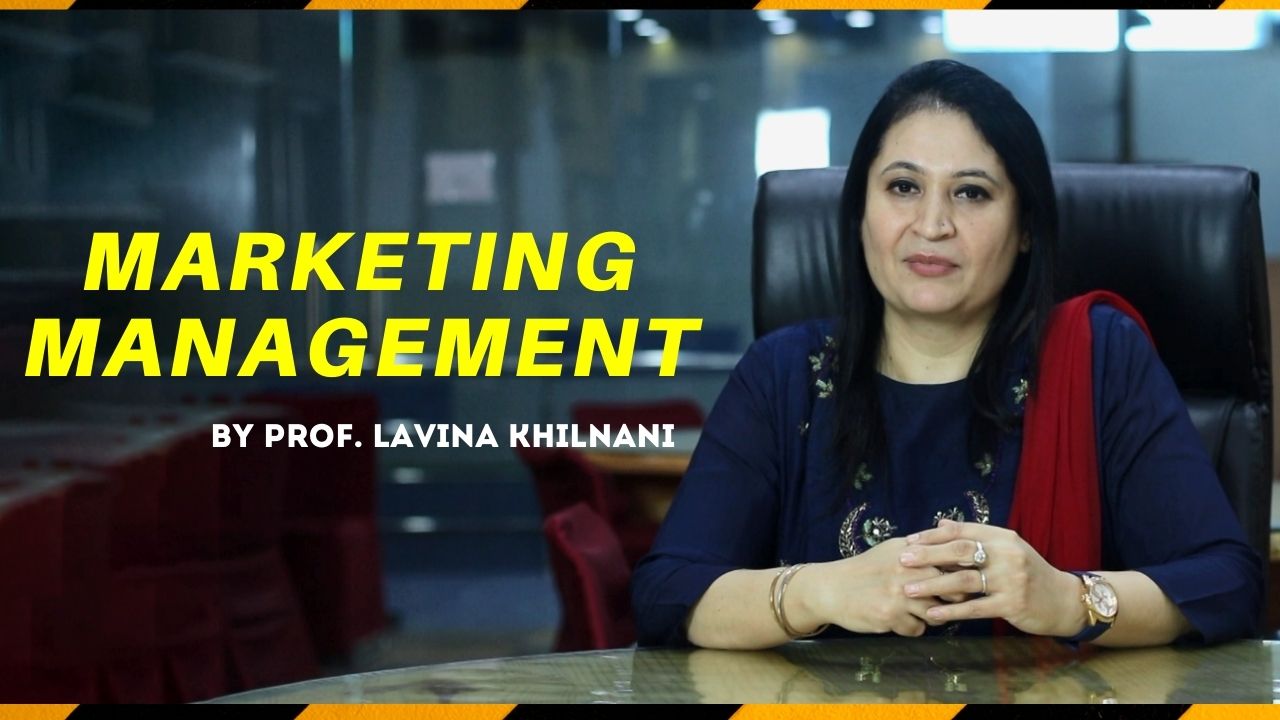Marketing Management
Course Overview
Faculty : Prof. Lavina Khilnani (MBA)
This course is designed to provide students with a comprehensive understanding of marketing management principles, strategies, and practices. Emphasis will be placed on the integration of technology and simulation tools to enhance learning and practical application.
Course Objectives
- Understand key concepts and principles of marketing management.
- Analyse the role of technology in marketing management.
- Develop skills in using simulation tools for strategic decision-making.
- Apply theoretical knowledge to real-world scenarios through case studies and simulations.
- Create and manage effective marketing strategies.
- Evaluate marketing performance and implement strategies to enhance market value.
- Navigate the marketing environment and adapt strategies accordingly.

Course Outcomes
On completion of this course, the students will be able to:
- Demonstrate a comprehensive understanding of marketing management principles.
- Effectively utilize technology and simulation tools in marketing management.
- Analyse market research data and consumer insights to inform marketing strategies.
- Develop and implement successful marketing strategies.
- Measure and manage marketing performance.
- Navigate the marketing environment and adapt strategies accordingly.
- Apply innovation and design thinking in marketing strategies.
- Create integrated marketing communications plans to support marketing management.
- Assess and manage global marketing challenges.
- Present and defend marketing strategies effectively.
Course Pedagogy
- Lectures: Theoretical foundations and key concepts will be taught through interactive lectures.
- Case Studies: Real-world examples will be used to illustrate the application of theoretical concepts.
- Group Discussions: Collaborative discussions to enhance understanding and encourage diverse perspectives.
- Hands-on Projects: Practical projects to apply learning in real-world scenarios.
- Simulations: Use of simulation tools to practice strategic decision-making and problem-solving.
- Navigate the marketing environment and adapt strategies accordingly.

Session Plan
Marketing Management Syllabus T29
| Session No. | Topics | Activities | Technology/Metrics |
|---|---|---|---|
| 1 | Introduction to Marketing Management | Lecture, Discussion on real-world examples | - |
| 2 | Understanding Marketing and the Marketing Process | - | |
| 3 | Gathering Information and Scanning the Environment | Brainstorming session, Role-playing exercise | - |
| 4 | Conducting Marketing Research and Forecasting Demand | Hands-on market research project. | Use of survey tools and statistical analysis software |
| 5 | Case Discussion | ||
| 6 | Creating Customer Value, Satisfaction, and Loyalty | Customer satisfaction assignment, Class presentation. | Customer satisfaction metrics |
| 7 | Analysing Consumer Markets | Consumer behaviour assignment. | Consumer behaviour analysis tools |
| 8 | Analysing Business Markets | Lecture, Discussion on real-world examples | - |
| 9 | Identifying Market Segments and Targets | Brainstorming session, | |
| 10 | Case Discussion | ||
| 11 | Creating Brand Equity | Case study on successful brands, Group discussion | Brand equity measurement tools |
| 12 | Crafting the Brand Positioning | Development of brand positioning strategy, Peer review | |
| 13 | Dealing with Competition | Competitive analysis project, Class presentation | Competitive analysis tools |
| 14 | Setting Product Strategy | Product strategy assignment, Class discussion | |
| 15 | Designing and Managing Services | Service design project | |
| 16 | Developing Pricing Strategies and Programs | Pricing strategy project, Data analysis workshop | |
| 17 | Developing Pricing Strategies and Programs | Pricing strategy project, Data analysis workshop | |
| 18 | Case Discussion | ||
| 19 | Designing and Managing Integrated Marketing Channels | Channel design project, Group discussion | |
| 20 | Managing Retailing, Wholesaling, and Logistics | Retail management assignment, Class presentation | Retail management software, logistics tools |
| 21 | Managing Retailing, Wholesaling, and Logistics | Retail management assignment, Class presentation | Retail management software, logistics tools |
| 22 | Designing and Managing Integrated Marketing Communications | Communication strategy project, Group discussion | |
| 23 | Managing Mass Communications Advertising, Sales Promotions, Events and Experiences, and Public Relations | Discussion | |
| 24 | Managing Personal Communications: Direct and Interactive Marketing, Word-of-Mouth, and Personal Selling | Direct marketing strategy project, Data analysis | |
| 25 | Group Discussion | ||
| 26 | Introducing New Market Offerings | New product development project, Peer review | Product development metrics |
| 27 | Tapping into Global Markets | Global marketing strategy assignment, Class discussion | |
| 28 | Case Discussion | ||
| 29 | Managing a Holistic Marketing Organization for the Long-Run | Course review and feedback, Discussion on future trends in marketing management | |
| 30 | Revision | Discussion and Problem Solving |
Course Materials
- Textbook: "Marketing Management" by Philip Kotler and Kevin Lane Keller
- Software: Access to simulation tools
- Additional Readings: Selected journal articles and case studies
Assessment
- Participation: Active participation in class discussions and activities
- Assignments: Regular assignments based on the topics covered
- Midterm Quiz: Evaluation of understanding of core concepts
- Simulation Exercises: Practical application of learned concepts through simulations
- Cases: Analysis and presentation of case studies
- • Final Project and Presentation: Comprehensive project and presentation on a marketing management strategy.

